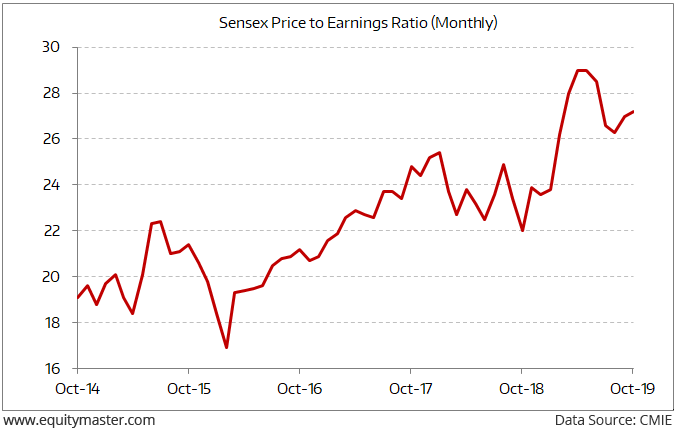India's Third Giant Leap
This Could be One of the Biggest Opportunities for Investors
- Home
- Todays Market
- Indian Stock Market News December 11, 2019
Indian Indices Erase Gains; Capital Goods and Metal Stocks Drag Wed, 11 Dec 12:30 pm
Share markets in India have erased early gains and are presently trading marginally higher. Investors are awaiting news from the cabinet meeting and Federal Reserve meeting outcome due later today.
Sectoral indices are trading on a mixed note with stocks in the realty sector and IT sector witnessing buying interest, while capital goods stocks and metal stocks are witnessing selling pressure.
The BSE Sensex is trading up by 39 points, while the NSE Nifty is trading up by 13 points. The BSE Mid Cap index and the BSE Small Cap index are trading down by 0.1%.
The rupee is trading at Rs 70.86 against the US$.
Speaking of the Indian stock markets, how expensive is the Sensex? What has the trend been in recent years?
It would be interesting to see how the valuation of the index has moved over the last five years.
The chart below maps the price to earnings ratio of the Sensex from October 2014 to now.
How Pricey Is the Sensex Now?
Here's what Ankit Shah wrote about this in one of the editions of The 5 Minute WrapUp...
- It is worth noting that the Sensex has gained 44% over the last five years, compounding at an annual rate of 7.6% (excluding dividends).
Not quite impressive.
During the same period, the Sensex price to earnings ratio has mostly been in a rising trend, except some intermittent declines.
Between October 2014 and now, the gain in the Sensex price to earnings ratio is 42%. That means that the gains in the index have mostly come from expansion in the valuation multiple, and just meagerly from increases in earnings.
So, before taking the current market bullishness for granted, do weigh in the fact that the Sensex is quite expensively priced.
Meanwhile, smallcap analyst Richa Agarwal talks about the ongoing economic slowdown, an upcoming rebound in the small cap space, and her number 1 stock pick for 2020 in the video below.
Tune in to find out more...
In news from the telecom sector, Bharti Airtel share price is in focus today. The company on Tuesday said it will seek shareholders' approval for raising Rs 283 billion (US$ 4 billion) via a combination of equity and debt.
In a regulatory filing, Bharti Airtel said the approval would be sought at the company's extraordinary general meeting (EGM) scheduled on 3 January.
In October, the Supreme Court decided in favour of the government's contention that all revenue, including that from non-core sources, would be counted in calculating AGR.
Licence holders have to pay about 8% of AGR to the DoT as fees. Telcos also pay about 3-4% of AGR as spectrum usage charges (SUC).
Bharti Airtel needs to go for the massive fund-raising exercise following the order. The apex court has given three months to companies to make the payments.
Airtel will seek shareholders' nod to raise US$ 2 billion through one or more instruments which could be a qualified institutional placement, compulsory convertible debentures or other convertible securities, ADR (American depositary receipts) and GDR (global depositary receipts).
The company plans to raise the remaining US$ 1 billion through issue of foreign currency convertible bonds (FCCB) or other similar security in foreign currency, and another US$ 1 billion via redeemable non-convertible debenture or a similar security.
Bharti Airtel owes the telecom department Rs 216.8 billion in licence fee and another Rs 139 billion as spectrum usage charges.
In other news, reports state that direct-to-home (DTH) operations of Bharti Airtel and Dish TV may merge.
As per an article in a leading financial daily, Bharti Airtel, promoters of Dish TV and private equity firm Warburg Pincus have agreed to merge DTH operations of Airtel and Dish, a move that will create the world's largest TV distribution company.
The report added that Warburg Pincus, which picked up 20% stake in Bharti Telemedia for US$ 350 million in December 2017, is expected to remain invested in the company post-merger.
How the above developments pan out remains to be seen. Stay tuned for more updates from this space.
Moving on to news from the IT sector, Wipro has signed a Memorandum of Understanding (MoU) with the Ministry of Technology and Communications (MTC), a government authority of the Sultanate of Oman, to launch Center of Excellence (CoE) for open source.
Under this MoU, Wipro and MTC will collaborate to build, deploy and sustain the CoE as well as accelerate adoption of open source technologies in the public and private sectors of Oman and the Gulf Cooperation Council (GCC) region.
The CoE will focus on building a talent base of Information and Communication Technologies (ICT) graduates specializing in open source capabilities through comprehensive training and skill development programs.
Wipro share price is presently trading down by 0.6%.
To know what's moving the Indian stock markets today, check out the most recent share market updates here.
For information on how to pick stocks that have the potential to deliver big returns, download our special report now!
Read the latest Market Commentary



Equitymaster requests your view! Post a comment on "Indian Indices Erase Gains; Capital Goods and Metal Stocks Drag". Click here!
Comments are moderated by Equitymaster, in accordance with the Terms of Use, and may not appear
on this article until they have been reviewed and deemed appropriate for posting.
In the meantime, you may want to share this article with your friends!